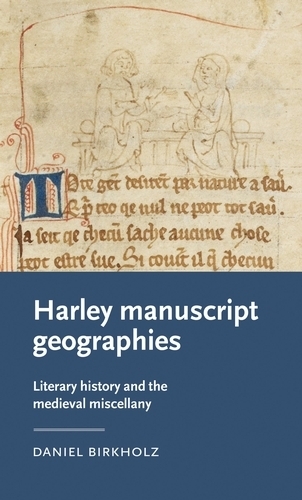
Harley Manuscript Geographies: Literary History and the Medieval Miscellany
(Hardback)
Publishing Details
Harley Manuscript Geographies: Literary History and the Medieval Miscellany
By (Author) Daniel Birkholz
Manchester University Press
Manchester University Press
30th June 2020
United Kingdom
Classifications
Tertiary Education
Non Fiction
History
Literary theory
809.02
Physical Properties
Hardback
344
Width 138mm, Height 216mm, Spine 21mm
544g
Description
This study brings new methodologies of literary geography to bear upon the unique contents of a codex known as British Library MS Harley 2253. The Harley manuscript was produced upon England's Welsh March, by a scribe whose generation died in the Black Death. It contains a diverse set of writings: love-lyrics and devotional literature, political songs and fabliaux, saints' lives, courtesy texts, bible stories and travelogues. These works alternate between languages (Middle English, Anglo-Norman and Latin) but operate in conversation with one another. The introduction explores how this fragmentary miscellany keeps being sutured into 'whole'-ness by commentary upon it. Individual chapters examine different genres and social groupings and demonstrate that there are many Harley landscapes still waiting to be discovered. It will be of great value to those studying literary history, medieval studies, cultural geography, gender studies, Jewish studies and book history. -- .
Reviews
'...is unquestionably timely and often stimulating At its best, Harley Manuscript Geographies challenges us to investigate the experiences, contributions and desires of multilingual readers who brought to this manuscript and others their imaginations and expectations, both social and literary.'
The Review of English Studies
'... this book will hold much appeal for Middle English scholars with a thirst for theoretically challenging approaches.'
Speculum
'Harley Manuscript Geographies is a virtuoso display of writing, as well as of critical acumen and probing, nuanced readings of texts that have not generally been subjected to such critical subtleties before.'
Studies in the Age of Chaucer
'There are some welcome moves in this book, including the review of the Jewish presence and absence, the enthusiasm for the Harley lyrics, and the reflections on plague that are both timely and untimely. Generous quotation from the texts and helpful translations will valuably support student readers.'
The Journal of British Studies
Author Bio
Daniel Birkholz is Associate Professor of English at the University of Texas at Austin
